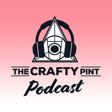
Brewing Traditional Beers In The High Country
We're pretty sure we've never seen anything close to the number of Oktoberfests taking place at breweries and bars around Australia as we're witnessing in 2024. So, as they started to ramp up, we sat down with Nathan Munt, co-founder and head brewer at King River Brewing, and a man who loves celebrating classic German and Belgian beer styles all year round.
He launched the brewery with his wife Brianna in the heart of the idyllic King Valley in the Victorian High Country back in 2016, with a lineup featuring an Altbier, Kolsch, and a style that had first made him fall in love with beer: a Belgian tripel called Waiting For Godot, for reasons explained in this episode of The Crafty Pint Podcast.
As well as sharing the story of how he went from a lover of food and wine to filling a garage with brewing equipment before swapping the world of banking for brewing trophy-winning beers, he discusses life running a small regional brewery, the joys of touring the High Country, sticking to his guns and brewing the styles he loves even as most of the industry was ignoring them, and his desire to see Kolsch properly understood and enjoyed in Australia. (Even if the pale ale he finally gave in and brewed five years after launching King River is now their best-seller...)
Links relevant to or referenced in the show:
Felons Brewing To Open Waterfront Venue In Manly: https://craftypint.com/news/3587/brisbane-based-felons-to-open-another-waterfront-venue-in-manly
Jervis Bay Brewing Co Become A B Corp Business: https://craftypint.com/news/3588/better-every-day-jervis-bay-become-a-b-corp
Behind Bars with Tristan Jallais of Natural Wine & Liquor: https://craftypint.com/news/3579/behind-bars-natural-science-wine-and-liquor
King River Brewing on The Crafty Pint: https://craftypint.com/brewery/352/king-river-brewing
Brew & A: Nathan Munt: https://craftypint.com/news/2942/brew-and-a-nathan-munt
Muntoberfest 2024: https://events.humanitix.com/muntoberfest-2024/tickets
To find out more about supporting the show or otherwise partnering with The Crafty Pint, contact craig@craftypint.com.
